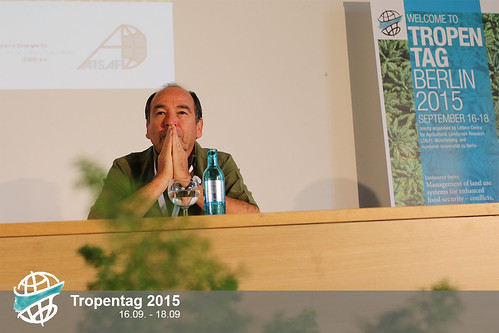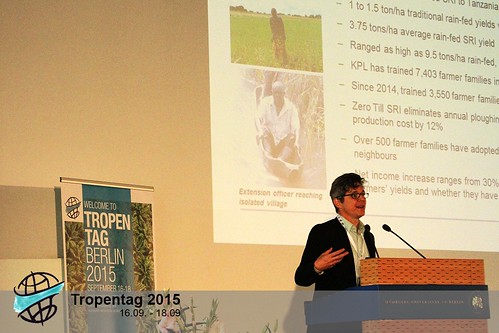Stoking the Fire
“We are going to have a controversial discussion, but a respectful one.”

I had been waiting for some conflict and controversy...for nearly three days. It was decidedly inconspicuous at a conference bearing those very words in its title. But now, here was conference organizer Stefan Sieber promising that controversy in the closing keynotes and plenary. The speakers, and their topics of choice, followed one of the most fundamental debates in the fields of agriculture and rural development - pitting the core philosophies around technology dissemination and institutional support versus grassroots innovation and social movements against one another. It helped to have someone stoking the fire. The first presenter, Bernard Vanlauwe addressed the challenges of land and soil degradation, and IITA’s work with fertilizers, seed germplasm, and organic resource management. Representing a CGIAR institution, he discussed public-private partnerships as a way to align objects and funding, but stayed along party lines.

The real meat came by juxtaposing a Louisiana agri-entrepreneur and a Chilean professor of agroecology. Carter Coleman is the CEO of the young rice production company, Agrica, with a mission to carry out commercial agriculture in East Africa in a sustainable manner. He caught the attention of the audience, many of whom hailed from Africa, by comparing working in agriculture to being a “rocket scientist” … and agriculture in Africa is likened to being on Mars. Photos of washed-out roads illustrated this point, and Coleman lamented the lack of facilities and expertise in-country. “I had to smuggle stem borers back to London,” he said, so they could be accurately identified and appropriately treated. In addition to lauding the efficiency of technology, like pivot irrigation, he argued that the “land grab thing is totally overblown”, when it is in fact expensive to operate in Africa. Despite the statements provoked some questions from the audience about resource drain and the imposition of Western ideals and methods, reminiscent of the colonial era, his approach was very matter-of-fact and business oriented. Yet Coleman’s presentation stood in stark contrast to the subsequent act, Professor Miguel Altieri from University of California, Berkely. “Industrial agriculture will not feed the world,” he asserted, emphasizing it only comprises 30% of food. He then proceeded to run through arguments against our current food system at a dizzying pace. Ultimately his take home was that “we need a new agriculture, but this new agriculture needs to have ethics”. His statements about the right to land, community-driven innovation, and curbing the influence of imperialistic mentalities in science, research, and development elicited a hearty applause from the audience. It was clear, though, that even within this group of tropical natural and social agriculture scientists, this same divide of ideologies exists and is perpetuated in our work. For me, all this controversy came too little, too late in the conference to catalyse much discussion, debate, and problem-solving amongst participants. But it gave us a taste of what challenges need to be on the table, if not completely resolved. There is no one clear path for a global agriculture and food system, nor could the keynotes have been expected to capture that. And, as the world grows smaller (more interconnected) with a growing population, greater demand for land and resources, and emerging constraints (e.g. climate change), we probably can use every tool in the toolbox. So I leave you with no conflicts or controversies resolved, only more questions. But there was a spark, and we need to continue fanning the flame. Until next year in Austria!





Comments
Post new comment